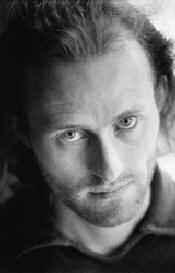English translation of Flemish poet Geert Buelens‘ poem “(i.m. dfw)”
published in the last issue of the literary journal yang (2008, #4)
as part of a tribute to David Foster Wallace
(in memoriam dfw)
i am here
here
in a cunning pan slipping up
and wondering
wondering wondering wondering
what if and whether and
because
really
could it go on like that
when your mind unfolds
like a glitch
like
mosaic affinity
and
come on now, you can’t possibly
mean that
this is how you’re wired
not buying it
is your default setting
right?
always seeing things differently
keeping options open
deploying pain management
as knowledge acquisition
understanding knowledge processing as
pain management
not everything is a language game
because everything is
but not everything is green
you know
not everything
is
as if it just came to be
in writing
Translated by Piet Joostens and Iannis Goerlandt – April 2010

Geert Buelens (Belgium, 1971) is a poet and Professor of Modern Dutch Literature at the University of Utrecht. In 2001 he attracted a lot of media attention with a book on the Flemish avant-garde poet Paul van Ostaijen and his influence on twentieth-century poetry in Flanders. This study was awarded the prestigious triennial Flemish Culture Prize for Essays in 2003, and has been widely acknowledged as the reference work on the experimental tradition in twentieth-century Flemish poetry.
In 2002, Buelens published his first collection of poems: Het is (‘It is’), which was awarded the Lucy B. en C.W. van der Hoogt-prize. In 2005, Buelens published his second collection of poems, Verzeker u (‘Ensure’). In 2008 he published Europa, Europa, an essay book about the effect of the First World War on modern poetry, in which he tries to contextualise the poetics of great European poets such as Rilke, Pessoa, Mayakovsky and Apollinaire.
Buelens has an extraordinary ear for rhythm and sound and is strongly influenced by twentieth-century American poetry. As a former editor of the literary magazine yang he translated American poets such as Bruce Andrews, Michael Palmer and Louis Zukofsky and edited a special issue of yang on LANGUAGE-poetry. At first sight his poetry appears to be difficult, and while it can hardly be called simple, it is never uncomprehensible. Rather, it links the quest for the appropriate linguistic structure with the everyday struggle of the lyrical protagonist.
(Maarten Crappé on Poetry International Web)